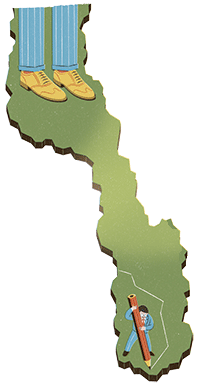The business of borders


Roula Khalaf, Editor of the FT, selects her favourite stories in this weekly newsletter.
This Sunday, the Ukrainian region of Crimea will vote over whether to become the Russian region of Crimea.
The circumstances are far grimmer, and hastier, than Scotland’s independence vote later this year, yet both votes are a reminder that national boundaries can be arbitrary things. They spring up, evaporate or move around based on popular votes, brute force or – as may happen in Ukraine – both.
Looking back 70 years, the broad trend is for borders to appear rather than disappear. There were 76 independent countries in the world in 1946; today the US recognises 195. The diplomatic definition of an independent country does not always accord with common sense: a beautiful district in Rome is on the list but Taiwan is not. Nevertheless, the story is indisputable: the world is home to more and more independent countries. Colonies have won independence from old empires and countries have been carved into smaller pieces. Mergers, as between East and West Germany, are rare.
The curious thing about nation states is that they aren’t economic units at all but political ones. We forget this because economic statistics are compiled on a national basis but a country is an unnatural unit of economic analysis. (This point was made forcefully by Jane Jacobs in her book Cities and the Wealth of Nations.) Far more sensible is to think about the economies of major cities and the regions that supply them. Barcelona and Madrid are separate economies. The economic dividing line in the UK does not run along the Scottish border between Berwick and Gretna – it circles London, taking in Oxford, Cambridge and Brighton. London is the true economic outlier in the UK. The reason it remains part of the country is because political boundaries are determined by politics, not economics.
Yet economics matters, at least at the margin. No purely economic theory could account for the simultaneous existence of China (population: 1.35 billion) and the Vatican City (population: less than the average British secondary school). But economic theories can explain some of the changes we have seen since the second world war.
The world economy is far more integrated now. Some of this globalisation is independent of national borders – the internet and the shipping container would make long-distance trade easier whether the world had a single nation or a thousand – but much of it is a function of lower tariffs and fewer non-tariff barriers.
In a world of high trade barriers it was expensive to be a small nation, because being a small nation meant having a small market. The historian Eric Hobsbawm tells us that the British prime minister, Lord Salisbury, admonished the French ambassador in the late 19th century, “If you were not such persistent protectionists, you would not find us so keen to annex territories!”
Trade barriers have fallen steadily since the end of the second world war while the number of nation states has risen – a pattern documented in the American Economic Review by three economists, Alberto Alesina, Enrico Spolaore and Romain Wacziarg.
There is some circularity here: smaller states are keen to lower trade barriers while low trade barriers enable smaller states to flourish. Scottish nationalists have, over the years, argued that the United Kingdom is unnecessary because an independent Scotland could prosper within the European Union and that trade would be easy because Scotland could use the euro or the pound. Unionists in the UK – and in Spain, which faces secessionist pressures of its own – have argued the reverse.
It is ironic that the pro-union side is so keen to talk about barriers to integration and the separatist camp is eager to portray a borderless economy. Still, the economic logic on both sides is clear enough.
So is there an ideal size for a nation? That depends on whose ideal we consider. Alberto Alesina distinguishes between the democratic equilibrium and the “Leviathan’s equilibrium”. A democratic equilibrium is what might result if any region could secede by popular vote. The Leviathan’s equilibrium is the outcome of a process in which larger countries may find it convenient to absorb smaller ones.
The Leviathan’s equilibrium has fewer and larger sovereign states because dictators do not much care about regional self-determination but they love the military strength that comes with scale. This is something Russia’s neighbours well understand. Smaller nations can form alliances but these are an imperfect substitute for having your own aircraft carrier. San Marino, the Holy See and doubly landlocked Liechtenstein are reliant on the indulgence of their neighbours for their existence.
Yet here, again, there is more at play than pure politics. As the world economy becomes ever more intangible, there is less to be gained from seizing territory by force. France could occupy Monaco before breakfast, if it so chose. But leaving aside history, law and simple good manners, what would be the point? An occupied Monaco would not be Monaco any more.
So smaller states are a consequence of democracy, of peace, and of free trade. Let us hope they continue to thrive.
Twitter: @TimHarford; Tim Harford’s latest book is ‘The Undercover Economist Strikes Back’
To comment on this article please post below, or email magazineletters@ft.com
Comments